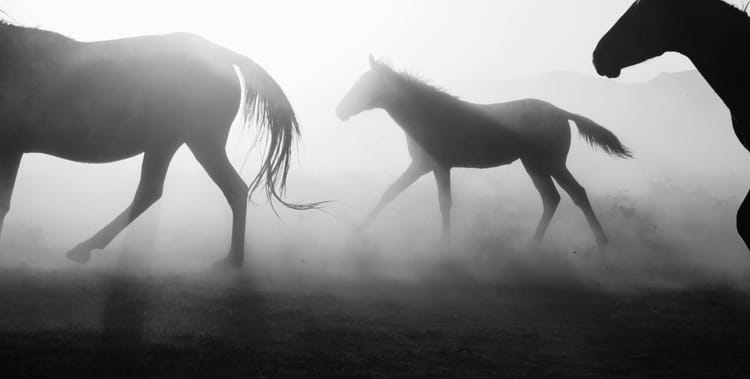The VVitch (2015): A Surrender Mistaken for Freedom

⚠️ Full Spoilers Below: This essay contains detailed discussion of The VVitch (2015), including its ending, major character arcs, and key thematic reveals. While the film is nearly a decade old, its emotional and philosophical turns are best experienced unspoiled. Proceed with caution if you haven’t yet watched.
From the moment Thomasin’s family is expelled from the plantation, their doom feels inevitable. Cast out not merely from society but seemingly from grace itself, they struggle within a wilderness mirroring their spiritual condition—unknown, unforgiving, and profoundly haunted. Their God remains silent, their prayers unanswered, every attempt at survival cruelly inverted. It’s a world shaped by inherited sin and unattainable virtue, where striving for goodness becomes distorted by fear, accusation, and despair.
Yet, when Thomasin stands alone at the end—bloodied, orphaned, accused—she still faces a crucial choice. She could cling desperately to the faith that has forsaken her, walk resolutely into the woods, and meet death with her soul intact. Instead, she listens to the seductive voice offering her beauty, pleasure, and freedom. Thomasin signs the book not because she is predestined to fall, but because power, for the first time, feels truer than submission. Her tragedy is not merely damnation—it is that damnation appears as the only genuine form of escape.
Eggers makes no effort to soften the supernatural. The witch is real. The Devil is tangible. The horror is not allegorical—it is explicitly theological. This clarity gives the film its visceral dread. There is no symbolic refuge, only stark judgment.
If Thomasin’s narrative explores the allure of power in the absence of grace, her father’s path embodies pride devoid of wisdom. William is not cruel but fundamentally misguided. His righteousness stems from pride, not humility or compassion. He leads his family into exile out of stubbornness, not divine command. He chops endless wood, symbolizing masculine providence, but provides no food. He prays fervently, yet harbors deception behind his son’s lies. His constant labor and self-inflicted punishments do not yield survival but hasten ruin.
The woodpile embodies this quiet collapse. William returns obsessively, chopping, stacking, sweating—symbolizing his futile efforts. Meanwhile, crops fail, traps remain empty, and guns misfire. His actions bring no salvation. When Black Phillip, the Devil incarnate, finally confronts him, William is not martyred heroically; he’s gored and buried beneath his futile monument. His false sense of purpose ultimately seals his fate.
What makes William tragic rather than villainous is his belated confession. He admits his failings to his wife, acknowledging the hidden sins. But this moment comes too late. His silence has already condemned Thomasin. His self-righteousness has blinded his household. In a world demanding perfect faith for salvation, William—a man ensnared by ego and weakness—is doomed from the outset. He succumbs not to temptation but to shame.
If William’s downfall is pride, Caleb’s is innocence itself. His journey unfolds as a nightmarish retelling of Genesis—a child drawn toward forbidden knowledge, punished not by divine wrath but by the cruel logic of a world in which desire itself is sinful. His encounter in the woods is not symbolic but visceral: temptation embodied. When he returns, silent and broken, he coughs up an apple.
This could feel overly symbolic, yet Eggers frames it as something sacred, almost sacramental. The apple is more than Edenic shorthand—it represents consequence itself. Caleb’s guilt, lies, and shame converge into this bloodied fruit. His subsequent death, euphoric rather than tormented, speaking in tongues and calling out to Jesus, blurs the lines between possession and ecstasy, damnation and deliverance. The film does not clarify, letting us instead feel the dizzying terror of innocence that provides no protection.
The hare serves as the film’s unsettling presence—a creature that never strikes, only watches. Its quiet, eerie appearances disrupt the family’s fragile stability. When Thomasin and Caleb discover a dead hare trapped, something shifts ominously. Yet another hare soon appears, drawing their dog away, disrupting their paths, guiding Caleb toward ruin. What is its true nature? A witch’s familiar, an embodiment of the forest’s rejection, or simply an omen of inevitable doom?
The hare supports multiple interpretations simultaneously. As a shapeshifter from European folklore, it seduces and deceives. As nature’s spirit, it embodies resistance against human intrusion. As pure omen, it manifests spiritual dread, blurring survival and ruin. It never acts overtly—it merely watches, unsettling and inexorable.
The film’s ambiguity becomes its curse. In this world, distinctions between sin and sickness, omen and beast, vanish. The hare embodies this blurring, never explaining itself, merely leading the doomed forward.
By the time Black Phillip speaks, Thomasin has lost everything—her family, her faith, her future. Bloodied and abandoned, she sits silently, waiting. The voice emerges quietly, gently seductive: Wouldst thou like to live deliciously?
It isn’t shouted or overtly sinister. That’s precisely why it’s horrifying. This is no coercion—it’s a soft invitation. He tempts her with butter, fine dresses, the sensuousness of bare feet upon the earth—gentle comforts, the very things her faith denied her. She accepts, not from a hunger for evil, but because no one else ever offered her a choice.
The Devil’s temptation isn’t power—it’s softness, comfort, freedom from fear. This quiet assent is terrifying precisely because it feels understandable. Thomasin signs willingly, steps into the darkness without force. The pact is sealed not in fire, but in quiet resignation.
The forest then reveals its answer—a coven of bodies, swaying and chanting beneath shadowed trees. Thomasin rises among them, laughing, weightless. The horror is not her abduction but her submission. In Eggers’ world of sin, sacrifice, and terrifying redemption, Thomasin could have clung to faith, died as a martyr. Instead, she exchanges conviction for comfort, a soul for relief. This dark Sabbath is no triumph—it is endurance surrendered, a haunting illusion of freedom.
Explore more film essays in the Film Reflections collection.



Comments ()